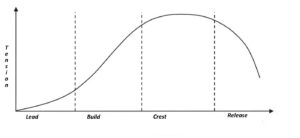Disclaimer: This article was created without access to or use of artificial intelligence. It intentionally violates many commonly-accepted SEO conventions. If that’s not acceptable to you, please stop reading now.
The Age of Enlightenment threw shade on perceptions that weren’t solidly grounded in rational thought. It gave us durable, rigorous Science, celebrated Reason and sparked a new understanding of History. The celebration of individualism in the American Enlightenment extended Martin Luther’s heretic notion of individual access to God in ways that also transformed Belief.
Unfortunately, our fascination with both Enlightenment and Reason has brought us to the precipice on which we stand today, peering into the future from head brains we have consciously disconnected from our hearts and souls.
Our problem-solving skills have literally led us to this cliffhanger. We thought that bigger, better, and faster wouldn’t be the disaster that they’ve become. Beginning in the computer era, we slid toward trust in popularity-based algorithms we called “artificial intelligence,” with the result that AI enervates the soul in ways we call “moral” while bearing witness to real-time computer-assisted harm playing out in our financial markets (no bailout is too big), our educational systems (STEM not STEAM), and, most tragically, in the persecution of Beliefs that appear as threats to Reason (pogroms continue to this day). We are complicit in delegating power to the leaders and institutions least able to wield it for our benefit – leaders and institutions whose vision is co-opted by greed.
We ought to have known better.
We have tried to subscribe to Reason’s myth of binary balance: left/right, light/dark, up/down, slow/fast. It’s a childish paradigm, so we refine it by introducing spectrums such as gender, politics, economics, behavior, and race to help things appear more balanced. Then, leaving Reason behind, we squabble over which slice of these spectra ought to be permissible within our anointed Belief systems. We’ve graduated from leveling the binary teeter-totter to spinning plates on sticks, and even as we call it good and nominate more and more ineffective magicians to keep it all from crashing down, is it any wonder that our collective anxiety increases? Science shouts, “Trust quantum everything!” while more and more of us hear the cry of “wolf!” and wonder just how real that wolf might be.
And, as if we needed any further indictment of Science and Reason, the COVID pandemic proved that our ability to Reason together had found a new low ebb. For many, Science and Reason failed dramatically to meet the challenge of SARS-CoV-2, which resulted in another hallmark of Enlightenment: the knee-jerk desire to place blame and sacrifice a scapegoat. Those responsible should be brought to justice, especially if efforts were made to obscure important facts.
But People! We are better than this!
One of the great tragedies of our age is the removal of the Humanities from education. Because The Arts aren’t a sustainable pathway to perceived riches, we discount them, ignoring the scientific technology of humanity itself that is researched, explored, and revealed in the novels, sociological texts, and factual History that we are now supposed to ban. Why invite emotion when it is so destructive? Why read novels that offer insight into History? Why explore the complexity of human interaction in literature when modern psychology can explain it to us diagnostically? Who needs to be an expert at nuance, perception, and paradox without a clear economic incentive? Far easier to manipulate the masses through fear and doubt than appeal to a humane understanding of right and wrong; conflict over petty issues (such as what color the American electorate might be) keeps pre-occupied American voters from making tough choices about how America is best governed.
Ditto that for many democracies right now. Play it in the full-court press for psychotic oligarchies and third-world dictatorships, the most troubling of which could trigger an all-out nuclear war without warning.
(This is not meant to be unkind. It is the truth that must be spoken.)
In short, there’s more to this situation than Reason will or can admit. Without a throttle, Reason will accelerate toward max q and damn the consequences; the balancing gravity of Humanity is seen as something else to escape or override rather than as a force to help sustain Reason’s flights of greedy fancy.
For example, Robert Oppenheimer’s valid concerns over weaponized nuclear fusion were sublimated to the desires of what General Eisenhower later called “the military/industrial complex” in the interest of an expedient end to World War II. Reason itself failed to prevent that shooting war from becoming a Cold War; the human cost of both wars, we are told, was a necessary price to pay. Earth is still paying – and will continue to pay – the cost of Reason.
Reason undergirds the war in Ukraine, too. Land that once belonged to Mother Russia must be reclaimed to preserve the national integrity, we’re told, the human cost of doing so be hanged. Mistaken Reason runs the War on Drugs and the War on Poverty, government education and health care, and much of the regulation in democratic financial markets. The incompetent discharge of government policies that result from ill-informed laws is inhumanely enforced on citizens in disproportionate ways one would think even Reason could identify.
The antidote is a recognition of shared humanity, a reaffirmation of reasonableness, a working understanding, and deployment of what we have denied ourselves for far too long: Grace.
Grace is the coincidence of Reason and Love. Grace thinks things through and sits down to dinner, eager to hear how others view things and how they feel about them. Grace offers safety for both ideas and intuition. Grace amplifies the smallest voice in a paradoxical quest for common sense solutions unavailable to cold Reason without the warmth of Love.
Grace is the melding of power and presence. Grace knows that carrying a big stick is not as powerful as purposefully putting it down. Grace stays at the table until all the courses have been served, all points of view have been understood, and everyone feels satisfied with the meal. Grace values engagement first and outcomes second. Grace offers patience, abhors artificial deadlines, and holds her guests in the conversation for as long as it takes.
Finally, Grace offers a four-cornered platform on which to build. Reason, yes, and Intuition, Intention, and Compassion firmly root Grace’s operational potential and sustain Grace’s vision. This could mean that expending all natural resources available on Earth or the potential for a civilization-ending nuclear war are lousy options, even if they could enrich the powerful at the expense of the powerless. Grace offers the stabilizing gravity for a steady orbit around the human issues that must be addressed if life on Earth is to regain its excitement, productivity, enjoyment, and safety for Earthlings to pursue their lives in ways to anticipate and achieve them.
If you read this and have some gut-level response that feels correct, that’s Intuition. If the vision of Grace is something you want, that’s Intention. And, at last, if you wish no harm to Earthlings, whether around you or distant from you, that’s Compassion. Combined with Reason, you can soar in ways you may have never thought possible.
How do we achieve this? It starts one to one, at home, with family, friends, and colleagues. Fortunately, Grace is contagious. Unfortunately, as we can see in our world right now, Grace is also a threat to the established, failing ways things have been done since the Age of Reason, so blowback is expected. Stand up and be counted but wear a flack jacket since the powers that be don’t want you to meddle with “the way things have always been done.” Fortunately, though, there’s good news about Grace: things change systemically when enough of us welcome it.
And that’s a promise. Don’t take this article’s word for it; put down the self-help, how-to, nonstop news, and endless technology-based solutions, and read something else for a change. Read Homer, Shakespeare, the Unknown Author of the Tao de Ching, Jesus, Mohammed, The Bhagavad Gita, or any books banned in your government school. Listen to singers, musicians, drummers, indigenous and modern composers, and improvised or symphonic works. Take time at your local museum or zoo to stare at art and animals until Reason gives way to Intuition, as Gaugin instructed his protegé, Rainer Maria Rilke. Make something awful, then make it again until it gets better. Get curious. Explore practice, discipline, and mastery as you learn a musical instrument, take up the fine arts, learn from a sensai, or sit patiently at the feet of a guru. It will take your time, but it will take your time away from Reason in pursuit of Intuition, Intention, and Compassion, resulting in a much more stable platform from which to extend your influence into our world.
Just don’t delay. The world needs you this way and soon. It’s not too late to start. You have the courage, and you know the world needs this from you now, not more empty code or more regulatory red tape or more conspiracy theory or more blame and shame. The intelligence we need can never be boxed into a computational artifice, and without your engagement in the art of living – the messy, complicated, unreasonable demands of a life well lived – you will have helped let everyone down rather than been a part of the uprising demanded of you now: the revolution of Grace.
__________________________
Bill Protzmann has advocated for improved consciousness for over thirty years. With an understanding of music, you can build skills such as those discussed here: intuition, intention, and compassion. Learn more about this work and take the online heroic Quest for transformation at Quest.Musimorphic.com



